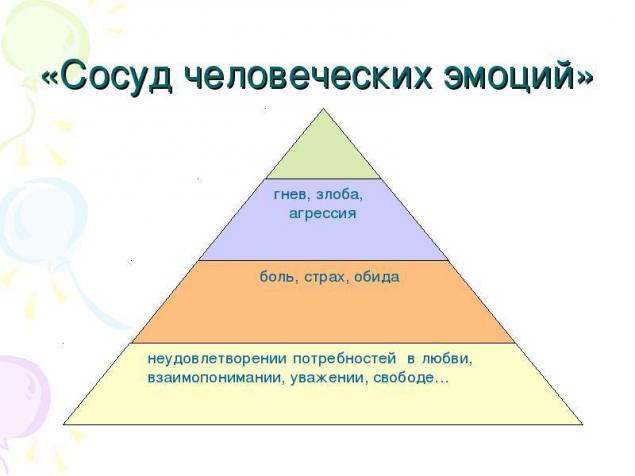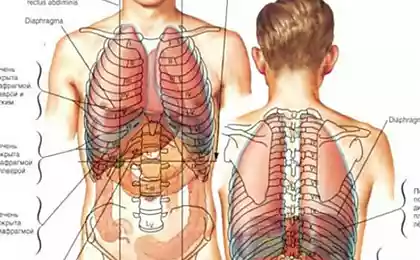451
Julia simultaneously on the causes of negative feelings
Simultaneously, Yulia Borisovna — known Russian psychologist, Professor of Moscow state University. Her books on child psychology are domestic bestsellers.
Talk about the unpleasant emotions — anger, rage, aggression. These feelings can be called destructive, as they destroy and the man himself (his mental health), and his relationship with other people. They are permanent causes of conflict, at times, material destruction and even wars.

Draw a "vessel" of our emotions in the form of a jug. Put the anger, malice and aggression in the uppermost part. Immediately will show how these emotions manifest themselves in external behavior. So, unfortunately, familiar to many name calling and insults, quarrels, punishment actions "in spite of", etc.

Now ask: what is anger? Psychologists answer this question is a little unexpected: anger is a secondary feeling, and it comes from experiences of another sort, such as pain, fear, resentment.
So we can put the feelings of pain, resentment, fear, anger under the feelings of anger and aggression, as the reasons for these destructive emotions (second layer of "jug").
PI all the feelings of that second layer — the passive: they present greater or lesser share of suffering. Therefore, they are difficult to Express, they usually are silent, they hide. Why? As a rule, from‑for fear to be humiliated, to appear weak. Sometimes the man himself they are not very aware of ("Just angry, and I don't know why!").
To hide the bitterness and pain are often taught from childhood. I guess you had to hear the father instructs the boy: "do Not cry, you better learn how to fight back!"
What are "passive" feelings? Psychologists give a very definite answer: the cause of the pain, fear, resentment —the unmet need.
Every person, regardless of age, needs food, sleep, warmth, security, etc. Is the so-called organic needs. They are obvious and we will not now speak.
Focus on those associated with communication, in the broadest sense — from the life of a man among men.
Here is a sample (not complete) list of such requirements:
The person needs to:
-to be loved, understood, recognized, respected;
-that it was necessary to someone and close;
-him to have success in business, studies, work;
-to enable them to realize themselves, to develop their abilities, cultivate,
to respect yourself.
If there is no economic crisis or war, the average organic needs more or less satisfied. But the needs just listed, are always in the risk zone!
Human society, despite millennia of cultural development have not learned to ensure psychological well-being (not to mention happiness!) each of its members. And the task is daunting. After all, the happier of a person depends on the psychological climate of the environment in which it grows, lives and works. And yet — from the emotional baggage accumulated in childhood.
Unfortunately, compulsory schools communication yet.
They simply arise, and then — on a voluntary basis.
So, any need on our list may be unmet, and this, as we have said, will lead to suffering, and perhaps "destructive" emotions.
Let's take an example. Suppose a person big no luck: one failure follows another. So not satisfied his need for success, recognition, maybe self-respect. As a result, it may appear persistent disappointment in your abilities, or depression, or resentment and anger at the "culprits".
And so is the case with any negative experience: for him we will always find some unfulfilled need.
Again, refer to the diagram and see if there's anything that lies below the layer needs? It turns out there is!
Sometimes at a meeting we ask each other: "how are you?" "How's life been?", "Are you happy?" and get in response "You know, I'm unlucky," or, "I'm fine, I'm fine!"
These responses reflect a special kind of human experience — about ourselves, the conclusion about myself.
It is clear that these relationships and conclusions can change with life circumstances. At the same time they have a "common denominator" that makes each of us more of a optimist or a pessimist, more or less believes in himself, and thus more or less resistant to the blows of fate.
Psychologists have devoted much research to such experiences themselves. They call them different: the perception of self, self image, self esteem, and often self-esteem. Perhaps the most successful word coined by V. Satir. She called it a complex and difficult parameter feeling a sense of self-worth.
Scientists have discovered and proved several important facts. First, they discovered that self-esteem (we will use this more familiar word) greatly affects the lives and even the destiny of man.
Another important fact: the basis of self-esteem is laid very early, in the first years of a child's life, and depends on how it is treated parents.
Common law is simple: a Positive attitude toward themselves — the basis of psychological survival.
Basic needs: "I am beloved!", "I'm good!", "I can!".
At the bottom of the emotional pitcher is the most important "jewel" given to us by nature — the feeling of life energy. We present it in the form of "sun" and denoted with the words: "I am!" or more pathetically: "is It I, Lord!"
Along with basic aspirations, it forms an initial feeling — a sense of inner well being and energy of life!" published
Source: www.go-up.ru/article/uvlech/46/
Talk about the unpleasant emotions — anger, rage, aggression. These feelings can be called destructive, as they destroy and the man himself (his mental health), and his relationship with other people. They are permanent causes of conflict, at times, material destruction and even wars.

Draw a "vessel" of our emotions in the form of a jug. Put the anger, malice and aggression in the uppermost part. Immediately will show how these emotions manifest themselves in external behavior. So, unfortunately, familiar to many name calling and insults, quarrels, punishment actions "in spite of", etc.

Now ask: what is anger? Psychologists answer this question is a little unexpected: anger is a secondary feeling, and it comes from experiences of another sort, such as pain, fear, resentment.
So we can put the feelings of pain, resentment, fear, anger under the feelings of anger and aggression, as the reasons for these destructive emotions (second layer of "jug").
PI all the feelings of that second layer — the passive: they present greater or lesser share of suffering. Therefore, they are difficult to Express, they usually are silent, they hide. Why? As a rule, from‑for fear to be humiliated, to appear weak. Sometimes the man himself they are not very aware of ("Just angry, and I don't know why!").
To hide the bitterness and pain are often taught from childhood. I guess you had to hear the father instructs the boy: "do Not cry, you better learn how to fight back!"
What are "passive" feelings? Psychologists give a very definite answer: the cause of the pain, fear, resentment —the unmet need.
Every person, regardless of age, needs food, sleep, warmth, security, etc. Is the so-called organic needs. They are obvious and we will not now speak.
Focus on those associated with communication, in the broadest sense — from the life of a man among men.
Here is a sample (not complete) list of such requirements:
The person needs to:
-to be loved, understood, recognized, respected;
-that it was necessary to someone and close;
-him to have success in business, studies, work;
-to enable them to realize themselves, to develop their abilities, cultivate,
to respect yourself.
If there is no economic crisis or war, the average organic needs more or less satisfied. But the needs just listed, are always in the risk zone!
Human society, despite millennia of cultural development have not learned to ensure psychological well-being (not to mention happiness!) each of its members. And the task is daunting. After all, the happier of a person depends on the psychological climate of the environment in which it grows, lives and works. And yet — from the emotional baggage accumulated in childhood.
Unfortunately, compulsory schools communication yet.
They simply arise, and then — on a voluntary basis.
So, any need on our list may be unmet, and this, as we have said, will lead to suffering, and perhaps "destructive" emotions.
Let's take an example. Suppose a person big no luck: one failure follows another. So not satisfied his need for success, recognition, maybe self-respect. As a result, it may appear persistent disappointment in your abilities, or depression, or resentment and anger at the "culprits".
And so is the case with any negative experience: for him we will always find some unfulfilled need.
Again, refer to the diagram and see if there's anything that lies below the layer needs? It turns out there is!
Sometimes at a meeting we ask each other: "how are you?" "How's life been?", "Are you happy?" and get in response "You know, I'm unlucky," or, "I'm fine, I'm fine!"
These responses reflect a special kind of human experience — about ourselves, the conclusion about myself.
It is clear that these relationships and conclusions can change with life circumstances. At the same time they have a "common denominator" that makes each of us more of a optimist or a pessimist, more or less believes in himself, and thus more or less resistant to the blows of fate.
Psychologists have devoted much research to such experiences themselves. They call them different: the perception of self, self image, self esteem, and often self-esteem. Perhaps the most successful word coined by V. Satir. She called it a complex and difficult parameter feeling a sense of self-worth.
Scientists have discovered and proved several important facts. First, they discovered that self-esteem (we will use this more familiar word) greatly affects the lives and even the destiny of man.
Another important fact: the basis of self-esteem is laid very early, in the first years of a child's life, and depends on how it is treated parents.
Common law is simple: a Positive attitude toward themselves — the basis of psychological survival.
Basic needs: "I am beloved!", "I'm good!", "I can!".
At the bottom of the emotional pitcher is the most important "jewel" given to us by nature — the feeling of life energy. We present it in the form of "sun" and denoted with the words: "I am!" or more pathetically: "is It I, Lord!"
Along with basic aspirations, it forms an initial feeling — a sense of inner well being and energy of life!" published
Source: www.go-up.ru/article/uvlech/46/























